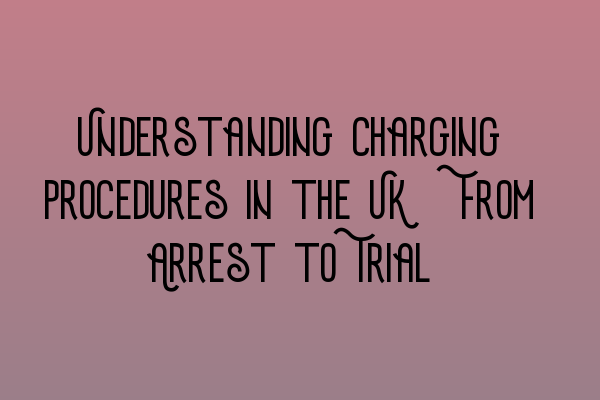Understanding Charging Procedures in the UK: From Arrest to Trial
If you find yourself caught up in a criminal case in the UK, it is essential to have a clear understanding of the charging procedures that take place from the moment of arrest to the trial. This knowledge can not only help you navigate the legal system with ease but also ensure that you make informed decisions along the way. In this article, we will break down the charging procedures step by step, providing you with a comprehensive guide to the process.
1. Arrest
The first stage in the charging process is the arrest. When the police have reasonable grounds to believe that you have committed a crime, they may arrest you. During this stage, it is crucial to remember that you have the right to remain silent and to seek legal advice. It is highly recommended to consult with a qualified criminal law solicitor at the earliest opportunity to understand your rights and receive proper guidance.
2. Police Investigation
Once you are arrested, the police will start their investigation. They will gather evidence, interview witnesses, and examine any forensic or digital evidence related to the case. This stage is crucial as it forms the foundation of the charging decision. It is important to cooperate with the police while being mindful of your rights.
3. Charging Decision
After completing their investigation, the police will submit their findings to the Crown Prosecution Service (CPS). The CPS is responsible for deciding whether or not to proceed with formal charges. They will assess the evidence provided by the police and consider the public interest in pursuing a prosecution. A skilled criminal law solicitor can help you understand the charging decision and advise you on potential courses of action.
4. Bail or Remand
Once the charging decision is made, the next step is to determine whether you will be released on bail or remanded in custody. Bail allows you to be released from custody under certain conditions, such as regularly reporting to the police station or surrendering your passport. If the court considers you a flight risk or believes that you pose a threat to the public, you may be remanded in custody until your trial.
5. First Court Appearance
During your first court appearance, a plea will be entered. You may choose to plead guilty or not guilty. It is important to seek legal advice before making any decisions that could impact the outcome of your case. A skilled criminal law solicitor can provide expert guidance based on the specific circumstances of your case.
6. Trial Preparation
If your case proceeds to trial, the preparation phase begins. Your solicitor will review the evidence against you, gather supporting evidence, and build a strong defense strategy. This stage involves careful analysis of witness statements, expert opinions, and any other relevant materials. It is crucial to work closely with your solicitor to ensure that all necessary preparations are made to present your case effectively in court.
7. Trial
The trial is the culmination of the charging process. It is where the evidence is presented, witnesses are examined, and legal arguments are made. The outcome of the trial will determine whether you are found guilty or acquitted of the charges. It is essential to have a skilled criminal law solicitor by your side throughout the trial to protect your rights and present the strongest possible defense.
Conclusion
Understanding the charging procedures in the UK is vital if you find yourself facing criminal charges. From the initial arrest to the trial, each stage requires careful navigation and expert legal advice. By familiarizing yourself with the process, seeking the assistance of a reputable criminal law solicitor, and making informed decisions, you can increase your chances of achieving a favorable outcome.
If you are preparing for a career in criminal law, it is crucial to acquire the necessary knowledge and expertise. Check out our related articles to gain insights into SQE preparation courses, practice exams, and important SRA SQE exam dates:
– SQE 1 Practice Exam Questions
– SQE 1 Practice Mocks FLK1 FLK2
– SQE 2 Preparation Courses
– SQE 1 Preparation Courses
– SRA SQE Exam Dates
By staying informed and well-prepared, you can lay a strong foundation for a successful career in criminal law. Good luck!
